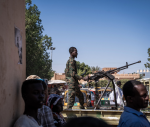You are here
International Women’s Day 2024: A path forward
Mar 07,2024 - Last updated at Mar 07,2024
Three decades ago, an unprecedented assembly of 17,000 representatives from 189 governments and 30,000 activists gathered in Beijing, united by a singular mission to champion gender equality and empower all women, everywhere.
Today, we stand at a juncture, reflecting on the progress made and the path that lies ahead.
As we observe International Women’s Day this 8th of March, it is crucial to reassess the promises made in Beijing, especially as we witness unfolding challenges that test our faith in the global commitment to women’s rights.
Jordan’s participation in the Beijing Conference, led by Her Royal Highness Princess Basma Bint Talal, epitomised the country’s dedication to the cause of women’s empowerment.
The Beijing Declaration and Platform for Action set forth an ambitious agenda, envisioning a world where every woman and girl could exercise her freedoms and choices, and realise all her rights, such as to live free from violence to access education, to participate in decision-making and to earn equal pay for equal rights.
Yet, the realities of today underscore the complexities of our global journey towards gender equality.
While significant strides in gender equality have been made around the world, with hundreds of millions more girls attending schools globally and a dramatic decrease in women’s maternal mortality over the past 30 years, the pace of change towards fulfilling the commitments made in Beijing remains painstakingly slow. Estimates suggesting that it could take centuries to close the global gender gap highlight the entrenched nature of these double standards, underscoring the urgency for action.
Progress in education and leadership roles, the widespread ratification of the Convention on the Elimination of All Forms of Discrimination against Women (CEDAW) and the widespread endorsement of the Beijing Platform for Action signal a global consensus on the importance of women’s rights. Yet, the legal and societal changes required to realise these commitments fully are lagging.
The secretary-general of the United Nations, in his message for International Women’s Day, poignantly noted, “Billions of women and girls face marginalisation, injustice and discrimination, as millennia of male domination continue to shape societies.” This statement encapsulates the global struggle for gender equality, emphasizing the systemic barriers that persist.
The ongoing tragedy in Gaza, in which over 9,000 Palestinian women have been killed, reveals with indisputable clarity the depths of such inequalities. The carnage in Gaza and the failure of States to create a world where all humans are equal, regardless of gender, religion or nationality, are challenging belief in the effectiveness of the very international laws and mechanisms designed to protect human rights. Some even call for an abandonment of those frameworks. Yet it is not the frameworks themselves that are inadequate or biased. It is rather the deficiencies in their application and in accountability that bring us to such terrible suffering as we see in Gaza.
These persistent challenges and inequalities bring us to an essential question: How do we best move forward?
The answer lies in the reaffirmation of our collective belief and commitment to the universality of human rights, including women’s rights, and the renewing of multilateralism for the years to come.
In September, world leaders will gather together in New York at a Summit for the Future to do just this: They will forge a new international consensus on how we deliver a better present and safeguard the future.
This once-in-a-generation opportunity serves as a moment to mend eroded trust and demonstrate that international cooperation can effectively tackle current challenges as well as those that have emerged in recent years or may yet be over the horizon. Jordan’s voice at this Summit will be an important contribution towards designing a better future for the region and the world.
The answer also lies in the resilience of people and progress of nations like Jordan, which, amidst adversity, continues to champion the principles of international law and human rights.
Jordan has achieved significant progress in terms of women’s rights, achieving gender parity in primary education, and having some of the highest levels of female enrollment in secondary and higher education in the region and the world. However, challenges remain, including in increasing women’s participation in politics and the workforce. The National Strategy for Women (2020-2025) and Jordan’s commitment to placing women’s participation at the center of its modernisation agenda provide a solid foundation for further progress.
As we look towards the Beijing + 30 Review process and the United Nations Summit of the future, Jordan’s role in shaping the global agenda for gender equality is crucial. These platforms offer unique opportunities to address the double standards in women’s rights and envision a future where gender equality is a reality for all women, everywhere.
The agencies, funds and programmes of the United Nations in Jordan are fully dedicated to strengthening our collaboration with the Government, civil society, private sector and other partners in advancing women’s rights within the country, as well as to supporting the Kingdom’s advocacy for greater protection and equality for women in Gaza, the broader region and the world.
This International Women’s Day, let us reaffirm our commitment to the promises of the Beijing Platform for Action, inspired by the achievements and resilience of nations like Jordan, ensuring that gender equality becomes a lived reality for every woman and girl around the world.
Sheri Ritsema-Anderson is the United Nations resident coordinator and Nicolas Burniat is the UN Women Country Representative













Add new comment